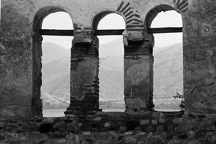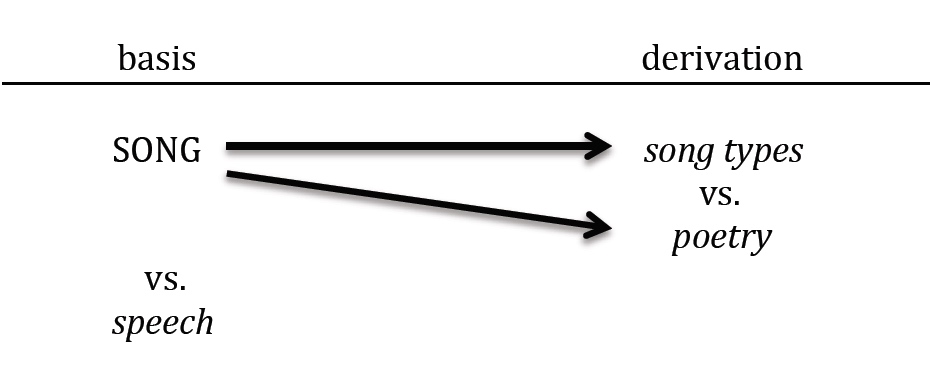
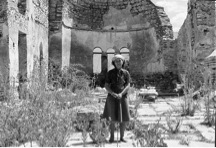
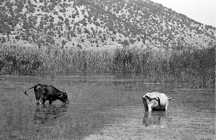 We reach the small chapel and monastery. The chapel has a decorated narthex, single nave, and trefoil apse. Christ, the Virgin, the apostles, look down on us in frescoes that are surprisingly intact. The iconography is modeled, not flat, with a great subtlety of expression. By the window, the light falls on a delicate painting of flowers, like those cheerful pan-Mediterranean decorations one sees on the wooden wardrobe panels of 18th and 19th century provincial Greek houses. This was a working monastery with quite a few resident nuns before the war. Anna’s mother took her to sleep in the church when she was ill as a small child (she was cured). Now only the foundations of the cells are visible above ground.
We reach the small chapel and monastery. The chapel has a decorated narthex, single nave, and trefoil apse. Christ, the Virgin, the apostles, look down on us in frescoes that are surprisingly intact. The iconography is modeled, not flat, with a great subtlety of expression. By the window, the light falls on a delicate painting of flowers, like those cheerful pan-Mediterranean decorations one sees on the wooden wardrobe panels of 18th and 19th century provincial Greek houses. This was a working monastery with quite a few resident nuns before the war. Anna’s mother took her to sleep in the church when she was ill as a small child (she was cured). Now only the foundations of the cells are visible above ground.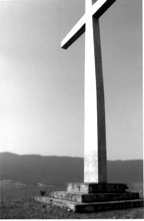 In 1990, Florina’s bishop generated international controversy by ex-communicating the esteemed director Angelopoulos and his actors in the film, The Suspended Step of the Stork, shot in the streets of the town. The Bishop insisted it was a communist film and that he would not allow it in his diocese, and he stirred up a frenzy of xenophobia. In an interview in a small magazine, the actor Marcello Mastroianni, suffering from the very cold winter conditions and waiting for the furor to die down so that the work could proceed, objected: “This film has serious meaning. It has to do with all of humanity, all people who have hard lives and who do not have the means to resist unjust power. What is the problem, then, with that scenario?… I think the bishop has gotten bad advice. I assure you this film is Christian. The people in the film have their little histories, their drama, their loves. The characters fall in love, love surpasses everything. The main theme is the power of young people to live free. What is more Christian than that? In this film when we speak of borders, we mean something universal, symbolic. It’s not about the frontier with Yugoslavia, or Albania, or Turkey, or any other country. It’s the idea that someone might wish, one day to remove all the borders and for human beings to be free, to have a place to live freely, and so, if they haven’t understood that, what have they understood. The question is not if someone is Greek, another one Albanian, another Turk, Kurd. We are not dealing with ethnic borders.” [3]
In 1990, Florina’s bishop generated international controversy by ex-communicating the esteemed director Angelopoulos and his actors in the film, The Suspended Step of the Stork, shot in the streets of the town. The Bishop insisted it was a communist film and that he would not allow it in his diocese, and he stirred up a frenzy of xenophobia. In an interview in a small magazine, the actor Marcello Mastroianni, suffering from the very cold winter conditions and waiting for the furor to die down so that the work could proceed, objected: “This film has serious meaning. It has to do with all of humanity, all people who have hard lives and who do not have the means to resist unjust power. What is the problem, then, with that scenario?… I think the bishop has gotten bad advice. I assure you this film is Christian. The people in the film have their little histories, their drama, their loves. The characters fall in love, love surpasses everything. The main theme is the power of young people to live free. What is more Christian than that? In this film when we speak of borders, we mean something universal, symbolic. It’s not about the frontier with Yugoslavia, or Albania, or Turkey, or any other country. It’s the idea that someone might wish, one day to remove all the borders and for human beings to be free, to have a place to live freely, and so, if they haven’t understood that, what have they understood. The question is not if someone is Greek, another one Albanian, another Turk, Kurd. We are not dealing with ethnic borders.” [3] 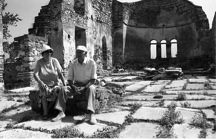 Anna and Pandelis also tell me the story of the Tsar Samuil and the bell. I wonder where the bell has gone, or if there ever was a bell. Some of the men in our lunch party have worked on the crews that rebuilt the basilica walls out of the debris of a millennium of marble, stone and brick. The preserved building, rough and eclectic, looks heroic in scale, like the Roman and Byzantine bridges that Greek rural legends attribute to a race of giant ancestors.
Anna and Pandelis also tell me the story of the Tsar Samuil and the bell. I wonder where the bell has gone, or if there ever was a bell. Some of the men in our lunch party have worked on the crews that rebuilt the basilica walls out of the debris of a millennium of marble, stone and brick. The preserved building, rough and eclectic, looks heroic in scale, like the Roman and Byzantine bridges that Greek rural legends attribute to a race of giant ancestors.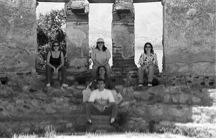
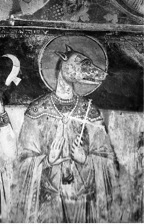 Sadly, he tells us that the dog head has now been ripped out of the stone by treasure hunters looking for gold. I hear a lot of tales of gold hidden in chests, gold hidden behind the dog-faced Christophers, gold hidden in corner stones. The stories are not entirely fantastical. People did hide their gold; and then they were forced to leave their properties and their imagined or real gold behind. When they moved to properties others had been in turn forced to leave, perhaps they hoped for some cosmic reciprocity for these disposessions. The archaeologist is telling this story as a plea, for people to honor the beautiful paintings and stones as valuable in themselves.
Sadly, he tells us that the dog head has now been ripped out of the stone by treasure hunters looking for gold. I hear a lot of tales of gold hidden in chests, gold hidden behind the dog-faced Christophers, gold hidden in corner stones. The stories are not entirely fantastical. People did hide their gold; and then they were forced to leave their properties and their imagined or real gold behind. When they moved to properties others had been in turn forced to leave, perhaps they hoped for some cosmic reciprocity for these disposessions. The archaeologist is telling this story as a plea, for people to honor the beautiful paintings and stones as valuable in themselves.As Mellios recounts, he saw this with his own eyes in 1956, or he would not have believed it. In the midst of what was until then the worst season of the Cold War –the Suez Crisis combined with the brutal Soviet assault on Hungary’s national uprising—as he was resigning himself to a global catastrophe, a renewed outbreak of world war, Prespans told him that what they saw in the lake predicted this: an outbreak of conflict, a great panic, and then a sudden, more or less immediate, resolution. They had read the future in the lake in 1870 with the French–German war, and again in 1914 -1918 with WWI, and again with 1939-1942 with WWII. Mellios, writing in 1976, two years after the fall of the right wing dictatorship, does not say anything about what was said about the levels of the lakes during the civil war from 1946 to 1949. He declares that the lakes are now in balance, and by this we can understand that he means that there is peace for the time being.
The main Greek eco-NGO, the Society for the Protection of Prespa, calls Prespa “an ecosystem that still resists,” that still “defends itself.” The lakes are the embattled breeding ground of ‘heroic’ migrant species, crossing boundaries despite global threats to their survival and political barriers to cooperation across old Cold War boundaries and new neo-liberal nationalist and pan-nationalist blocs. Some Eastern European news bulletins report a hazardous increase in water levels and average temperatures in the lakes as a result of global warming; others report that the Big lake, blighted by pesticide, is drying up. The local population worries: its survival is predicated now on a delicate balance of agriculture dependent on abundant water and cheap Albanian labor, shrinking government pensions and dwindling civil service employment, sporadic tourism, fragile family enterprises, remittances from globalized kin. The twelve year old daughter of my friend Olga tells me they don’t teach local Prespa history in school, and anyway only the old people talk about the past anymore; her grandmother, she notes, used to talk about nothing else, and never forgave anyone. The equation of history and ‘ruin’ here is strong (as Olga asked me, honestly perplexed and somewhat irritated, “What is it with you foreigners and the ruins?”). A new generation seeks resolution in the aftermath of so many centuries of war by rejecting (perhaps like the generation whose trajectory Homer described) “problems of justice…right vs wrong…truth vs lies.” [8]
